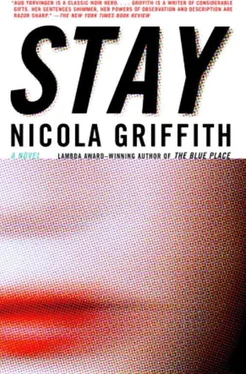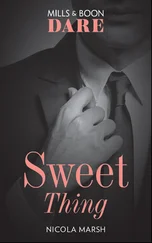“I don’t—”
“—where she is and why her name is on your mailbox.”
“There’s no law against that. Is there?”
“We’ll talk about it inside, Mr. Donato.” I mounted another step, lightly, easily, walking right at him, and he blinked, then gave in.
The hall smelled of old dishwater and uncleaned toilet and there were boot marks on the paintwork. He led me into the living room, where he hurriedly cleared takeout cartons, and a stack of what appeared to be bad charcoal sketches, from a love seat, looking embarrassed and about seventeen years old. I ignored the couch and stepped back into the hallway, stuck my head in the kitchen, then the filthy bathroom and the mess and disorder of the bedroom. A nice apartment, clearly beyond this boy’s apparent means, both economic and psychological. It was also clear that only one person lived here.
“Give me her forwarding address.”
“What?”
“Tammy Foster’s forwarding address.”
“I don’t have that!” He sounded genuinely surprised.
“Tell me where you send her mail.”
“But I don’t.”
He began to shift from foot to foot. He wasn’t lying. “Explain.”
“It’s like, you know, an arrangement.” I waited. “They pay me. This is Mom’s apartment. I mean she pays the rent but I live here. She doesn’t pay for, you know, food or clothes because she says if I want to waste my time on—Right, okay. So this dude pays me a few bucks a week to collect their mail, and that’s about, you know, it.” He shrugged with his thin arms, inarticulately.
“Does Karp or Foster come and get it?”
“No. I just toss it in the garbage.”
“You throw their mail in the garbage.”
“Well, yeah.”
It would be so easy—my right hand on his right wrist, pull and step, left arm across his throat, whirl and spread my arms, like a dance, and he would drop spine-down over my thigh, snap: less than three seconds, start to finish—but a broken boy would help nothing. The adrenaline ebbed.
“Do you have any mail addressed to them that you haven’t thrown away yet?”
“Yeah.”
“Give it to me.” In the absence of adrenaline I felt mounting irritation.
“Uh, isn’t opening other people’s mail like a federal offense?”
“It’s exactly like a federal offense. So is aggravated assault.” I reached slowly into my inside pocket, giving him time to register the fact that I wore gloves.
“Whoa! I was just—”
“Bring me the mail.” He scuttled off into the kitchen and came back with five envelopes and two catalogues, all obviously junk apart from one white envelope with a familiar blue logo. “Give me the one from American Express.” It was addressed to George G. Karp. I opened it. A bill. Not a solicitation, but a regular bill. I scanned the list of charges. It seemed genuine. I put it in my pocket. “What else do they get?”
“Stuff. I don’t keep track, you know?”
“Visa? Utility bills?”
“Yeah, like that.”
Why would someone go to the trouble of setting up a mail drop and getting bills and other correspondence mailed to it, only to have those bills thrown away? “How much does he pay?”
“It used to be twenty-five a week, but when he added the Foster chick’s name, I told him, man, I can’t do it for less than forty.”
“Cash?”
“Well, duh. Every other Thursday, in the mail. Paid last week.”
I reached into my jacket again. Before he had backed up more than two steps I pulled out my wallet. He bobbed his head: a combination of relief and greed. I extracted five crisp twenties. “I want to know everything you know about Karp and Foster.”
I put my gloves in my pocket and walked around the Village for a while. Donato had not been able to remember what bills had come or what the cycle was, and he couldn’t describe Karp except that he had, you know, maybe sort of blondish hair? He’d only met him, like, once. Tammy he had never seen. I had taken back four of the twenties.
Tammy had to be here. She’d told Dornan this was where she was going after Naples. Her credit card confirmed it. I had followed the money and it led nowhere except back to Tammy’s Atlanta apartment and to a mail drop. But if she hadn’t lied to Dornan, then she was here with Karp. Find Karp, find Tammy. I knew Karp was somewhere close: his American Express showed dozens of charges to Manhattan restaurants, mainly in midtown, SoHo, and the Village, with a few in Brooklyn.
I wandered past endless coffeehouses on MacDougal Street. It was only eleven o’clock, not yet lunchtime, but the crowds were growing, the air starting to feel used. A double-decker bus stuffed with tourists rumbled past.
Inside the café, there was one spare table and a line at the counter. Most of the people sitting and sipping were talking—half to friends, the other half to their phones. One woman tapped diligently on her tiny keypad and frowned at the display. The web. Of course. You had to have an official billing address for a credit card or utility, but you could pay by phone or online.
Somewhere, Karp would have an e-mail address, maybe even a business website. I didn’t have my laptop and my phone screen was tiny, its processing power more suited to instant text than a web search.
A hard-eyed young thing behind the counter asked me what she could get me. I ordered latte, and dropped two ones in the tip jar. “Where’s the nearest library?” I asked.
“Library? Public library?”
“Yes. Where is it?”
“Hold on.” She called back over her shoulder to the man behind the espresso machine. “Hal, the library’s at Sixth and Tenth, right?”
“Around there, yeah.”
She turned back to the counter and spoke to the customer behind me. “Get you something?”
The library was an imposing brown-and-white building that looked like a cross between a Gothic cathedral and the Doge’s Palace. There were two Macs on the second floor, one, on the right, already taken by a woman in her fifties, who froze when I came into her peripheral vision, and stared rigidly at her screen until I sat.
A Google search brought me eight hundred hits, none of which seemed to be a home page. There was a profile from Talk a year ago, a Business Week cover spread, and literally dozens of features in obscure trade journals, both print and web-based. Interestingly, there was no photo: both the Talk and Business Week articles were accompanied by the cover illustration for his book, Hostage Exchange: Their Money for Your Goods , which had been reprinted in a paperback edition last month.
The woman next to me had relaxed enough to resume her tapping. Every now and again she sighed loudly.
There were several links relating to recent and forthcoming appearances; he was doing a reading and signing at the Citicorp Center Barnes and Noble in four days. I skimmed half a dozen interviews: repeated citations of design awards, recycled plaudits from a variety of retail executives, including a glowing but utterly impersonal quote from the Nordstrom VP of Full Service Stores, some number-dense analyses of retail sales from various stores pre- and post-consultation with Karp, and one snippet in an article written almost five years ago about how Karp worked from his SoHo loft “with a cell phone and a laptop.”
The articles shared a sameness that hinted at very, very careful information management by Karp. It wasn’t easy to control the editorial content of magazines. I wondered how he had done it. Then I laughed, aloud, which made the sighing woman look at me sharply—funny how tiny infractions made people bold. I gave her a smile with a lot of teeth.
Most magazines rely on advertising revenue; many advertisers are retailers; Karp had great contacts in the retail world. A discreet word here, a favor called in there would bend a few rules. But favors were usually costly in any profession. What did he have to hide?
Читать дальше












